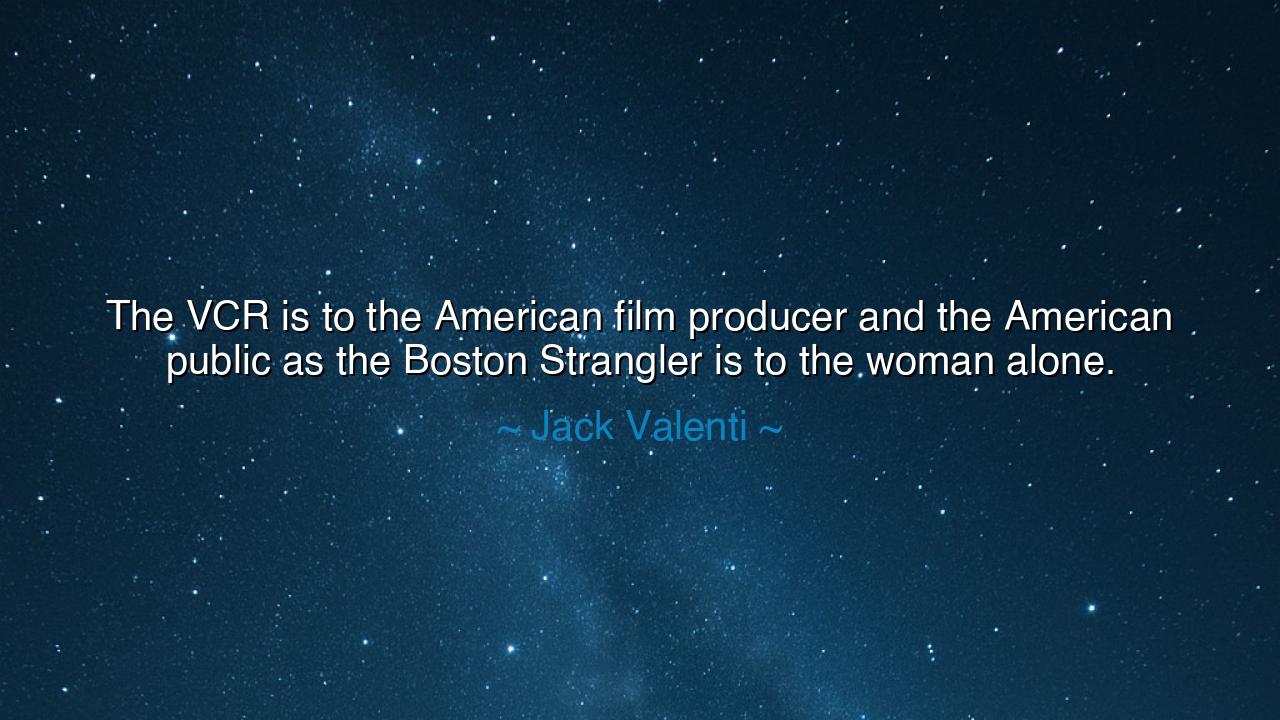
The VCR is to the American film producer and the American public
The VCR is to the American film producer and the American public as the Boston Strangler is to the woman alone.






When Jack Valenti, the fierce guardian of American cinema, uttered the words “The VCR is to the American film producer and the American public as the Boston Strangler is to the woman alone,” he spoke with the passion of one who saw a storm approaching — a storm that threatened the very heart of his craft. To the casual ear, the comparison may seem extreme, even shocking. But beneath its dramatic tone lies a deeper truth about fear, change, and the eternal struggle between creation and technology. Valenti was not speaking merely of machines, but of the fragile bond between the artist and the world that consumes his art.
In the early 1980s, when Valenti was president of the Motion Picture Association of America, a new invention called the VCR — the videocassette recorder — had begun to appear in American homes. To many, it was a marvel: a box that allowed one to record movies from television, to watch films in the comfort of one’s own home. But to Valenti and the guardians of Hollywood’s golden gates, it was a herald of ruin. He feared that if people could copy films freely, the cinema itself — the temple of shared imagination — would fall silent. Thus, he compared the VCR to the Boston Strangler, the infamous killer who preyed upon women in their solitude. It was not mere rhetoric; it was a cry of alarm, the lament of an industry facing its own mortality.
The ancients, too, knew this pattern — that every new tool born from the mind of man brings both creation and destruction. When Prometheus stole fire from the gods, he gave warmth and light to humanity, but also the power to burn and destroy. So it is with all inventions: they are gifts with double edges. The VCR, to Valenti, seemed a thief of the sacred flame of storytelling, a force that would rob creators of their livelihood and turn their art into a disposable commodity. Yet, as history would reveal, the very thing he feared became a vessel of survival. The VCR did not strangle cinema; it renewed it. It brought films into every home, gave old classics new life, and built the foundation of the home video revolution — the forerunner of modern streaming.
In this, there is a lesson as ancient as time: fear often misjudges the future. Even the wisest among us, when faced with change, see first the shadow rather than the light. Valenti’s words, fierce and prophetic, remind us that when the world shifts beneath our feet, our first instinct is to protect what we know. But progress is not a thief — it is a sculptor. It carves away the old forms to reveal new shapes beneath. What seems like death may in truth be transformation.
Think of the scribes who once feared the printing press. They believed their sacred labor would vanish, that books would lose their soul once copied by machine. Yet from that invention arose the Renaissance, the spread of knowledge, the awakening of minds. So too did the artists of cinema, once threatened by the VCR, discover that their creations could now reach across oceans and generations. The Boston Strangler they feared was, in truth, a messenger of a new age.
But Valenti’s warning still carries wisdom — not against the machine itself, but against complacency. Every generation faces its own VCR, its own unsettling invention that seems to threaten the familiar order. The lesson is not to curse progress, nor to worship it blindly, but to meet it with vision and courage. Those who fear change perish in its wake; those who understand it shape its course. The artist must learn, not to hide from the tools of the age, but to master them, to make them serve beauty instead of banality.
Therefore, my child, when you hear the thunder of new invention — be it machine, idea, or power yet unseen — do not shrink back in dread. Look deeper. Every tool holds both danger and promise. Like Valenti, you may be tempted to guard the past, but remember: art and humanity are not strangled by change; they are tested by it. The fire that threatens to consume us can also be the light that leads us forward. The question is not whether the world will change, but whether we will rise to meet it.
So take heed of Valenti’s cry, and learn from both his fear and his faith. For though the VCR did not destroy the film, it reminded mankind of a sacred truth — that every age of creation must defend its soul anew. The world will keep inventing, breaking, and rebuilding, but only those who keep their hearts open to both peril and possibility will shape the story that endures.






AAdministratorAdministrator
Welcome, honored guests. Please leave a comment, we will respond soon